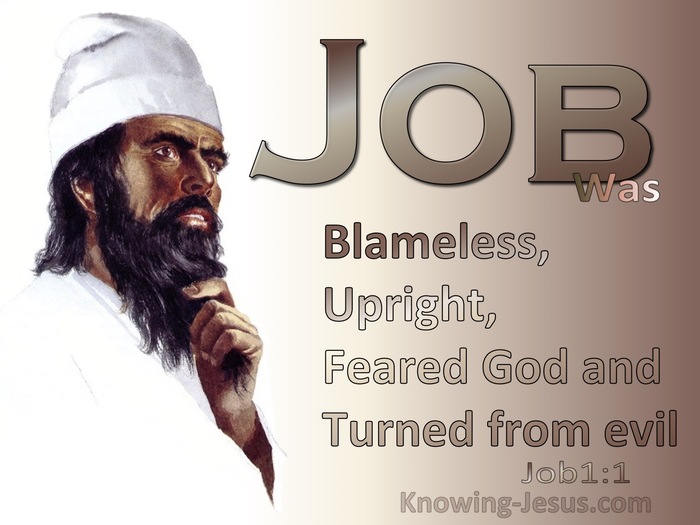◄ What Does Job 1:1 Mean? ►
There was a man in the land of Uz whose name was Job; and that man was blameless, upright, fearing God and turning away from evil.
Job 1:1(NASB)
Verse of the Day
In the opening verse of Job, we are given certain distinctive features about the main character who lived in the land of Uz. We read he was a good man who feared the Lord and turned away from evil. Although we later discover he was wealthy, highly esteemed by all, and a man of prayer with 10 adult children, reverence for the Lord is a distinctive feature which identified Job as someone with a teachable spirit and a desire for godly understanding: "For the fear of the Lord is the beginning of wisdom, and knowledge of the Holy One gives understanding."
Later, we learn that Job was severely tested by Satan and as the book progresses, we gain insight into his own attitude towards God, and his friend's incorrect doctrine that God's blessing exclusively falls on the righteous while His punishment only touches wicked men. The entire dialogue in Job exposes this misconception, and in the New Testament, James clearly explains that God's blessings are not exclusively for the righteous and His punishment is not exclusively for the wicked: "Every good gift and every perfect gift is from above and comes from the Father of lights, Who never changes... for the Lord causes His sun to rise on the evil and the good, and He sends rain on the righteous and on the unrighteous."
There are many lessons that can be learned from the book of Job and the immense suffering he underwent. We have a bird's-eye view into the spiritual realm and how maintaining faith in God's Word honours His name. We realise that the enemy of man's soul desires to shipwreck our faith. We see that the battle between good and evil is ongoing and that much of the conflict takes place in the heavenly realm, but is withheld from our sight.
It provides us with an understanding of how God relates to man and His long-suffering kindness towards us. It helps us grasp what the Lord desires from His people and gives us a greater appreciation of the spiritual benefits of suffering in our lives, even when His actions seem to contradict His character.
It demonstrates the immense impact a godly man can have on others and it shows the importance of intercession and prayer for family and friends. It helps to answer the question on so many lips: "Why do bad things happen to good people? Why do God's servants have to suffer when the ungodly seem to have a problem-free existence?" It also helps to identify the faulty perception of God, to which most of the world clings: that God's blessings fall exclusively on the righteous while retribution only touches wicked men.
God is always good, and evil is always a result of sin, but God is not the author of sin. He is the Creator of all that is good and wholesome, and it is God's sovereign right to bless whosoever He chooses. And although He promises to bless those who trust Him, He does not promise that evil will never befall them, however, in this age or in the ages to come, He will turn evil to good for those that love Him because He works in our lives from an eternal perspective.
Every character in the book of Job, including Satan, had developed an incorrect perception of God's character and nurtured a faulty understanding of human suffering. The Lord's detailed reply to Job did not answer his many questions, but it did demonstrate God's omniscience, His goodness and grace, His forbearance and mercy, His wisdom and strength, His kindness, and His favour towards His servant.
None of us get from God what we deserve, instead we are given what we do not deserve: "God commended His love towards us in that while we were yet sinners, Christ died for us."
Let us not only consider the sufferings of the man who lived in the land of Uz, who was blameless, upright, feared God, and eschewed evil, but let us also rejoice in the immeasurable grace of God, His never-ending goodness, His long-suffering mercy, His perfect justice, and His everlasting righteousness.
My Prayer
Heavenly Father, I bless and thank You for the many lessons I can learn from the book of Job. Like so many before me, I too have misrepresented Your grace and favour toward mankind through my own lack of understanding and limited perception. Thank You for Your goodness and grace, Your forbearance and mercy, Your wisdom and strength, and Your kindness and favour toward us all. You commended Your love toward us in that while we were yet sinners, the Lord Jesus Christ died for us. Thank You for not giving us what we deserve, but instead giving us what we do not deserve. Help me to come to a deeper knowledge and understanding of Who You are, and help me to live my life in a way that honours You. In Jesus' name I pray, AMEN.
Choose a Verse from Job 1
Job 1:1 Further Study
- Job 1:1 in the Parallel Bible
- Job 1:1 in the Thematic Bible
- Job 1:1 Cross References
- Job 1:1 Treasury of Scripture Knowing
- Job 1:1 Sermons
- Job 1:1 Prayers
- Job 1:1 Images
- Job 1:1 Devotionals
- Choose Chapter
Never miss a post














